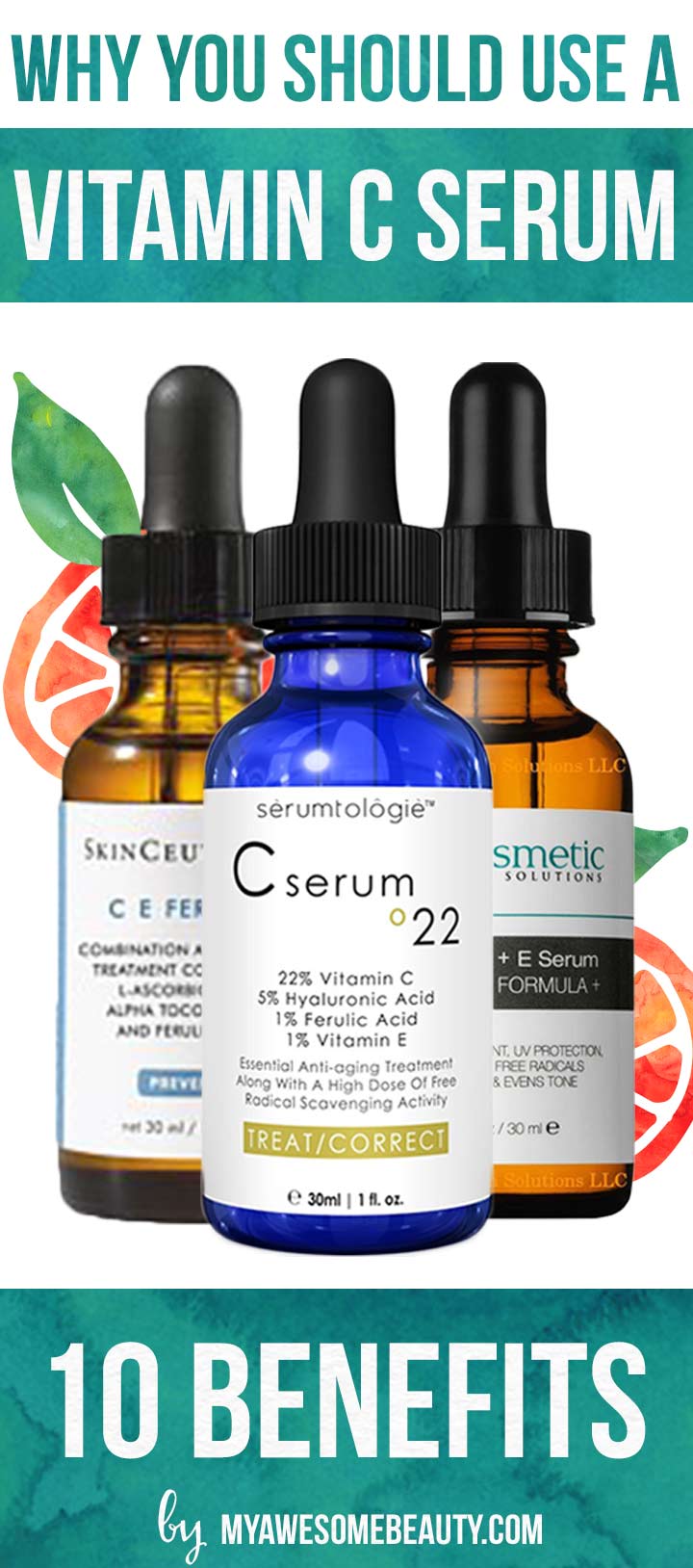
There are so many Vitamin C serum benefits that it would come as no surprise that they have become an incredibly popular cosmetic product.
If you know anything about me, then you probably know that I literally cannot live without it for my day and night beauty routine. (No, I am not addicted…. ok, ok I admit I am a little….)
You’ve probably seen several skincare fads in your time, and even bought some of your own only to never use them again. These vitamin C serums, however, are unlikely to be the kind of products that you use once and push to the side. This is mostly down to the amazing job this antioxidant product does for your skin. It works just how the reviews say it does.
The good thing about vitamin C is that it is not only for women of a certain age, it can be and should be used by women or men of all ages and skin types.
Vitamin C Serums VERSUS Vitamin C Creams
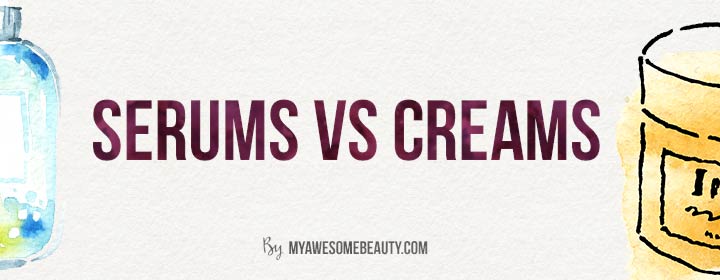
You should understand that facial serums and facial moisturisers are not the same thing. Many cosmetic skincare brands offer both serums and creams.
Serums are lighter and thinner than moisturisers. They are applied to the face between cleansing and moisturising. Serums typically have specific functions, such as protecting from free radicals and reducing the signs of aging. They are designed and formulated to penetrate deep into the layers of your skin, while moisturisers work more on the superficial surface tissue.
The most important thing about serums is that they have more active ingredients compared to day and night creams that ensure you have noticeable results.
That is why if I had to choose between a vitamin C serum or a vitamin C cream: it is a no brainer, I would pick the serum and I know I’m not the only one.
A facial serum with vitamin C offers the most benefit for topically applying this vitamin. Vitamin C can penetrate deep into the skin to stimulate the production of collagen and protect skin from environmental factors such as pollution and ultraviolet rays.
Quick tip: If you’re looking to increase penetration for any active ingredients of skincare products, you should regularly exfoliate skin to remove dead skin cells that are preventing penetration. Exfoliation boosts nutrient absorption.
This means that you get the absolute most out of your skin serum and save money by saving serum. Exfoliate your skin regularly to ensure as much serum as possible is absorbed deep into the skin. That is why I regularly exfoliate my skin with microdermabrasion, which is one of the best antiaging tools: check our detailed reviews of the best microdermabrasion machines for home use here.
Vitamin C Serum benefits or Vitamin C cream benefits

You are probably wondering what you can expect from a good vitamin C serum; just what about these serums keep skin care experts, aestheticians, and dermatologists alike consistently recommending them?
What are those fantastic vitamin C serum benefits? Why should you be applying vitamin C serum to your own skin?
Before going on, please note that the vitamin C cream benefits will be roughly the same, except those mentionned earlier (lower penetration, less easy to combine with other products, thicker and less easy to apply … )
Ok, Let’s just get right down to it and look at the benefits of vitamin C serum.
Benefit 1: Enhances collagen Production to Keep Skin Young and Firm

The main benefit of Vitamin C is that it stimulates the production of skin collagen by stimulating fibroblast activity. Fibroblast is the most common cell that produces collagen, so stimulating it increases the amount of collagen produced in skin.
Keep in mind:
- Collagen is the most abundant form of protein in the body. Almost 70% of the proteins in your skin is collagen. Collagen is naturally produced by the body and is responsible for keeping your skin plump and young!
- By the time you reach your late 20s, the amount of collagen in your body starts to diminish. By the time you reach your 70 – 80s, you’re going to have around four times less collagen, which is why skin sags and wrinkles as you age.
- Collagen production can be affected by environmental factors such as pollution and your lifestyle choices, which can diminish the elasticity of your skin.
This means that it is possible to stimulate collagen production and have it fill in the fine lines and wrinkles on your skin. This means you can really get younger and firmer skin without having to get expensive – not to mention risky – cosmetic surgery.
Check our complete guide about the best vitamin C serums here
Benefit 2: Prevents Stretch Marks
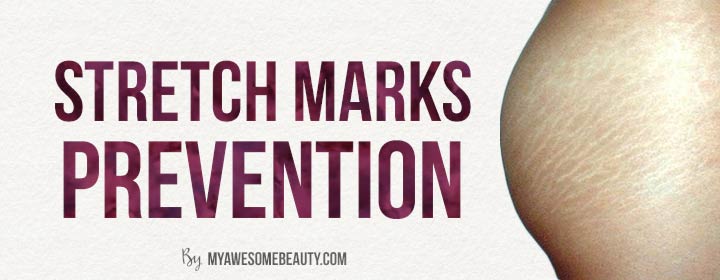
We’ve seen that vitamin C helps stimulate collagen production. Collagen is needed to keep skin looking young, healthy, and firm. It also helps keep skin flexible, which prevents stretch marks caused by gaining – and losing – weight and pregnancy.
Collagen is produced in the middle layers of the skin. If the skin is stretched too much without any flexibility, it causes the middle skin layers to scar. The scars appear on the top layers of the skin and form stretch marks. Much like rubber bands, skin tears if it stretches too much.
How much collagen your body naturally produces declines as you get older, which is why stretch marks are one of the signs of aging.
Keeping the amount of vitamin C you have up allows you to fight this decline in collagen production. This leaves you with firmer, more flexible skin as you age without having to use expensive creams and oils.
Just to make sure you get our message right: it is to prevent stretch marks, not to remove them. Stretch marks are one of the cases where prevention is better than the cure!
Benefit 3: Protects Skin from Sun Damage

In order to properly understand how applying vitamin C topically to your skin can prevent sun damage, you must first understand how free radicals and antioxidants interact in the body.
- Free radicals are a kind of molecule created during the metabolism of oxygen to create energy at the cellular level. One electron is taken from the oxygen molecule, which turns it into a dangerous free radical.
- The formation of free radicals can also be augmented by the UV radiation of sunlight.
- Free radicals will roam the body looking for an electron they can use to achieve balance. They will sometimes steal electrons from other healthy cells, and this is considered to be the root cause for a range of health problems from plain old aging to deadly cancer.
- Antioxidants can protect healthy cells by offering a electron to a free radical, making them harmless
So, how is it that vitamin C can help protect from the sun?
UV exposure also decreases the levels of naturally occurring vitamin C in the skin; so applying it topically keeps vitamin C levels normal.
A word of caution: while vitamin C does offer sun protection benefits, it should not be considered an alternative to sunscreen, whether in serum or cream form. You should still apply a moisturiser with SPF or an SPF lotion on a regular basis.
Check our complete guide about the best vitamin C serums here
Benefit 4: Slows Down the Aging Process
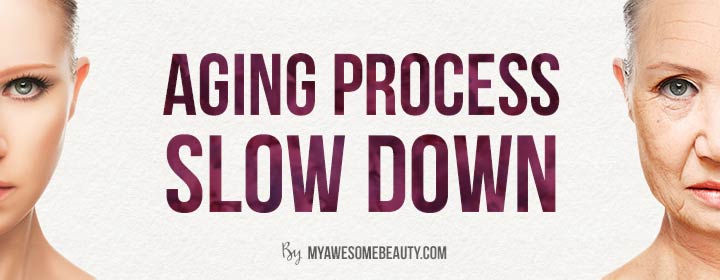
Now that you’re aware of the damage free radicals can do, what if I did not tell you the whole story?
Exposure to sunlight causes free radicals to form, but there are other external factors that can stimulate their production including emotional stress (yep), smoking (yep), and pollution.
Those free radicals belong to one family of free radicals called the Reactive Oxygen Species (ROS) and they happen to be the most harmful form of free radicals.
So people are exposed to ROS through the air they breathe (oxygen), UV sunlight, cigarette smoke, smog, and stress. ROS attacks every kind of cell there is in a process known as oxidative stress. They mutate DNA, damage the dermis layer of skin, destroy its natural moisture barrier, cause inflammation…ok in other words, it cause wrinkles, rough skin, and brown spots.
Note that using a vitamin C is great, but if you add in your diet, fruits and vegetables rich in antioxidants, this will even be more effective at preventing aging and keeping your youthful good looks for longer.
Benefit 5: Helps Prevent Skin Glycation or Skin Hardening
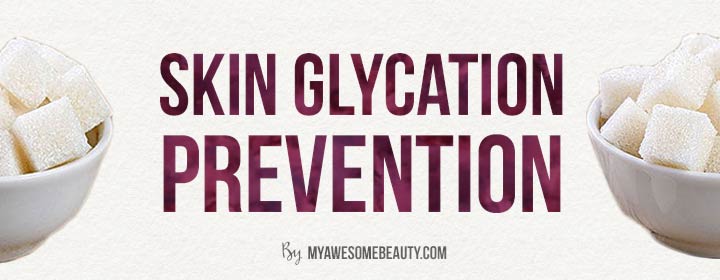
You’re likely wondering what skin glycation is. It’s a spontaneous reaction between sugars – such as glucose and fructose – and proteins such as collagen residing in the skin. The process creates glycation end products – known as AGES – that damage collagen molecules, causing stiffer and brittle collagen. This causes the skin to harden, making it less supple and more susceptible to wrinkling and sagging.
There are a number of mechanisms that contribute to the glycation process, including our old friends the free radicals. This time they come from the family Reactive Carbonyl Species (RCS).
RCS is a carbon-based free radical that is created by eating too many carbohydrates and drinking too much alcohol. They are known to cause glycation, which is when skin proteins – such as collagen and elastin – are coated in a sugar-like substance. This hardens them and makes them inflexible, causing skin to lose tone (sagging), fine lines, and wrinkles.
A serum rich in vitamin C is able to protect skin collagen by neutralizing glycation before it can become an issue and prevent accelerated aging.
If you need an example to help understanding how free radical neutralisation works, then we’ll have to talk about food for a minute.
Apples are one of the best visual examples of oxidation. You might have heard that it’s good to add lemon juice to apple slices.
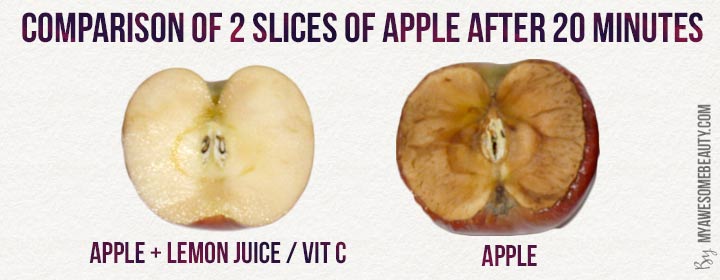
What do you think would happen if you only applied the lemon juice to some apples and left them for 20 minutes?
You would see that there is a big difference between the treated and untreated apple slices as the untreated ones will have begun to brown. This brown coloring is caused by oxidative damage. Lemon juice is, of course, a rich source of vitamin C.
This example shows how topically applying vitamin C can prevent oxidative damage and reduce the visible appearance of skin damage.
You’re likely wondering why you shouldn’t just apply lemon juice to your face. This is something that you should not do because it causes irritation and dryness over time. Pure lemon juice also lacks the stability and delivery system of properly formulated skin care serums, meaning that it wouldn’t be nearly as effective.
Check our complete guide about the best vitamin C serums here
Benefit 6: Hydrates and Moisturises Dry Skin
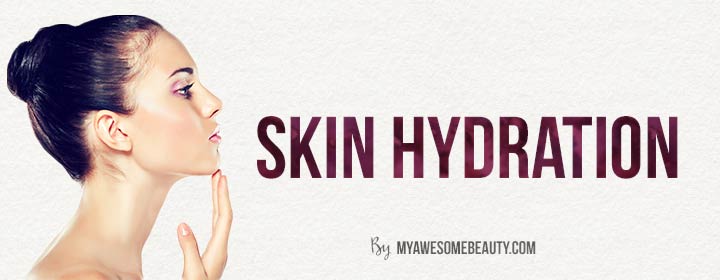
It’s already known that orally consuming vitamin C can improve dry skin. One study showed that vitamin C decreased skin roughness in humans. It could have something to do with the collagen-boosting effects of vitamin C, which improves the overall appearance of the skin and making it better able to stay hydrated and hold on to moisture.
My own dry skin has improved quite a lot after using vitamin C serums; it’s much smoother.
However, I should say that my skin didn’t improve immediately. There were times I thought it was actually getting worse before I saw results in the 3rd week.
I used another cream after applying vitamin C serum to combat the temporary dryness. If you plan on doing this, then wait at least 5 minutes between applications so your skin can absorb the serum.
Benefit 7: Helps Fade Brown Spots to Leave Skin And Complexion Brighter

Applying vitamin C topically can remove sunspots and brown spots. It works by preventing overproduction of the pigment melanin. Vitamin C disrupts melanin production to improve skin colour. It can actually decrease how much pigment is produced by melanocyte skin cells that cause too much pigment.
The reason for this brightening effect is that vitamin C inhibits tyrosinase; an enzyme needed to produce skin pigment. Therefore skin discolouration caused by sunspots and age spots can be reduced by inhibiting this function.
Continued use of vitamin C serums will lighten these brown spots known as hyperpigmentation.
The Journal of Drugs in Dermatology published evidence showing how applying vitamin C topically can treat age spots caused by overexposure. The study was published in 2002 and it involved using a 24% solution of vitamin C (L-Ascorbic acid) to show the effects of skin treatment. Only 20 people were involved in the study, 16 of which who showed a 2-3 grade improvement in pigmentation, fine wrinkle lines, and surface roughness. Researchers concluded topically applying vitamin C (L-Ascorbic Acid) is a safe and effective treatment for age spots.
Another study from the 2011 Journal of Cosmetology and Dermatology – a randomized controlled study – was published to evaluate how effective ascorbic acid (vitamin C) and phtic acid were at depigmenting age spots – known as solar lentigines. Researchers discovered that the treatment was effective and came with very few side effects.
This means vitamin C is able to lighten existing age spots while also helping prevent new ones from forming, improving the overall complexion of your skin, brightening your skin, and making it look its best.
Of course, the only way to achieve the best results with vitamin C serums are by being consistent. You should apply your vitamin C serum daily – preferably both in the morning and the evening – for best results.
If you also avoid the UV rays that stimulate pigment production in the first place, or use an effective sunscreen, you are on the right track to get the pure and clean skin you’ve always dreamed of. Great skin also requires less makeup, which saves you money in the process.
Check our complete guide about the best vitamin C serums here
Benefit 8: Reduces Inflammation, Redness, and Protect Capillaries
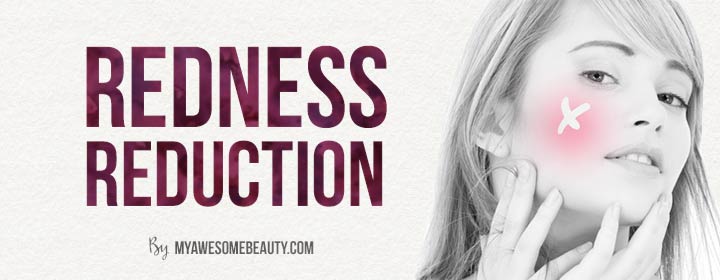
It has been shown that vitamin C – if used in high enough concentrations – is able to reduce inflammation. If you have sensitive skin that seems to get angry a lot, then you’re probably keenly aware of inflammation.
There is a wide range of things that cause inflammation, but the result is usually the same: flushed, red, itchy skin. Inflamed skin can feel as bad as it looks, and it looks like your face is on fire.
There is some good news however, in that vitamin C serum puts out this facial fire. It has anti-inflammatory benefits that enable it to help with even advanced inflammation causes such as rosacea and acne scars.
Vitamin C is also able to fight against yet another family of free radicals (ok last one haha); this one known as Reactive Nitrogen Species (RNS). RNS is a nitrogen-based free radical typically found in the environment, such as in woods, parks, farmlands, and gardens. It is released by nitrogen-rich fertilisers, car exhausts, and the “exhalations” of trees. RNS is responsible for inflaming the skin, but it can be neutralised by antioxydants such as vitamin C to prevent skin inflammation. (I told you vitamin C is a superstar active ingredient…)
Benefit 9: Speeds up Sunburn Healing
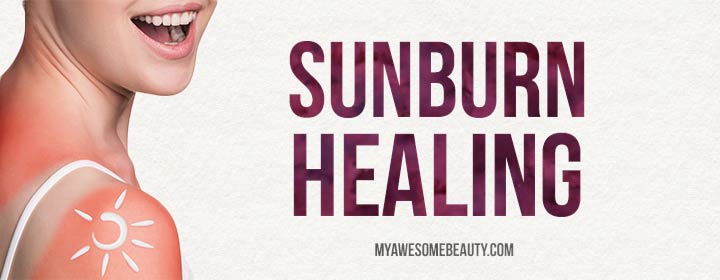
What is a sunburn? A sunburn is basically a response to extensive UV damage. Any colouration of the skin, including tans, is a direct response to UV exposure. Sunburns are red because of the extra blood from your capillaries, which is why they turn white when pressed only to turn red again as capillaries fill back up.
The redness is also a sign that UV radiation – radiation from both natural and artificial sunlight (tanning beds) – has damaged the DNA of your skin cells. It doesn’t even take a severe sunburn to cause skin damage. Any level of damage can cause skin cancer; the most common form of cancer in the United States.
If you can remember back to what we said about vitamin C and sun damage, you’ll remember that vitamin C serum is able to prevent sunburn and protect the skin. However, is there anything that can be done if you get a sunburn?
I have my own personal trick for soothing and removing sunburns.
I start by applying vitamin C and then I apply pure aloe vera gel as well. I repeat this process once every 30 minutes for 2 hours, then I only apply the aloe vera gel every hour until the redness is gone. Afterwards I moisturise my skin using a regular moisturiser. This process is great for treating sunburns. I notice that it can take much longer to treat sunburn if I don’t use the serum.
My tip here is to store some aloe vera gel in your fridge to give it an extra calming and cooling effect and increase its effectiveness. Remember that you should use only a high quality aloe vera gel. Avoid the synthetic stuff. Our favorite aloe vera brand is here on Amazon ( cost effective and natural )
Benefit 10: Fades Hyperpigmentation and Acne Scars
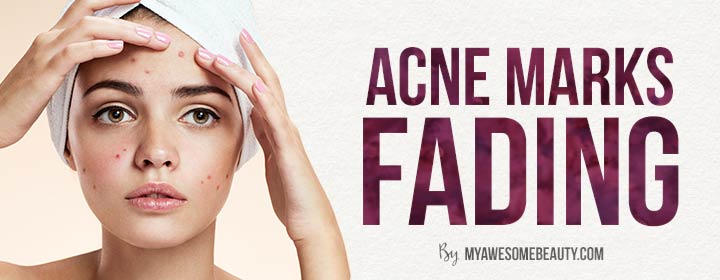
Given all the other vitamin C serum benefits so far, you probably won’t be surprised to learn that it can treat acne scars in three ways:
- Vitamin C lightens pigmentation and evens out skin tone by reducing melanin production, which improves discoloured areas left behind following an inflammatory breakout. It also evens out pimples.
- Vitamin C fills in indented acne scars by boosting collagen production and smoothing skin.
- Vitamin C can reduce redness and inflammation from acne caused with oily skin predisposed to pimples.
However, don’t forget that you should not rely on just vitamin C. you can check our post about our favourite vitamin C serum for acne. But keep in mind it is also recommended that you follow a great acne treatment and exfoliate your skin regularly to improve it and banish acne in the long-run. Check our reviews of the best acne treatments here. Battling acne is one of those long-term things that feels like it never ends.
Now that you know the vitamin C serum for face benefits, you understand why I have become so enamoured with vitamin C serums. It’s by far one of the most powerful skincare and beauty products on the market for keeping your skin looking as young as possible for as long as possible.
Tips for using Vitamins C serums
- Always make sure your vitamin C serum colour has not turned brownish as it would mean your serum is oxydized and useless. Don’t use it on your face.
- To make the most out of your vit C serum, use it after your regular skin exfoliation so to maximize its skin penetration. ( don’t let the dead skin cells be in the way)
- Wait at least for 2- 5 minutes after applying your serum so to let it penetrate before applying your day cream or night cream.
References and sources:
- https://www.ncbi.nlm.nih.gov/pmc/articles/PMC3673383/
- https://www.ncbi.nlm.nih.gov/pubmed/22406231
- https://www.ncbi.nlm.nih.gov/pubmed/17921406
- https://www.ncbi.nlm.nih.gov/pubmed/10522500
- Kumano Y, Sakamoto T, Egawa M, et al. In vitro and in vivo prolonged biological activities of novel vitamin C derivative, 2-O-alpha-D-glucopyranosyl-L-ascorbic acid (AA-2G), in cosmetic fields. J Nutr Sci Vitaminol (Tokyo). 1998;44(3):345-59.
Leave a Reply